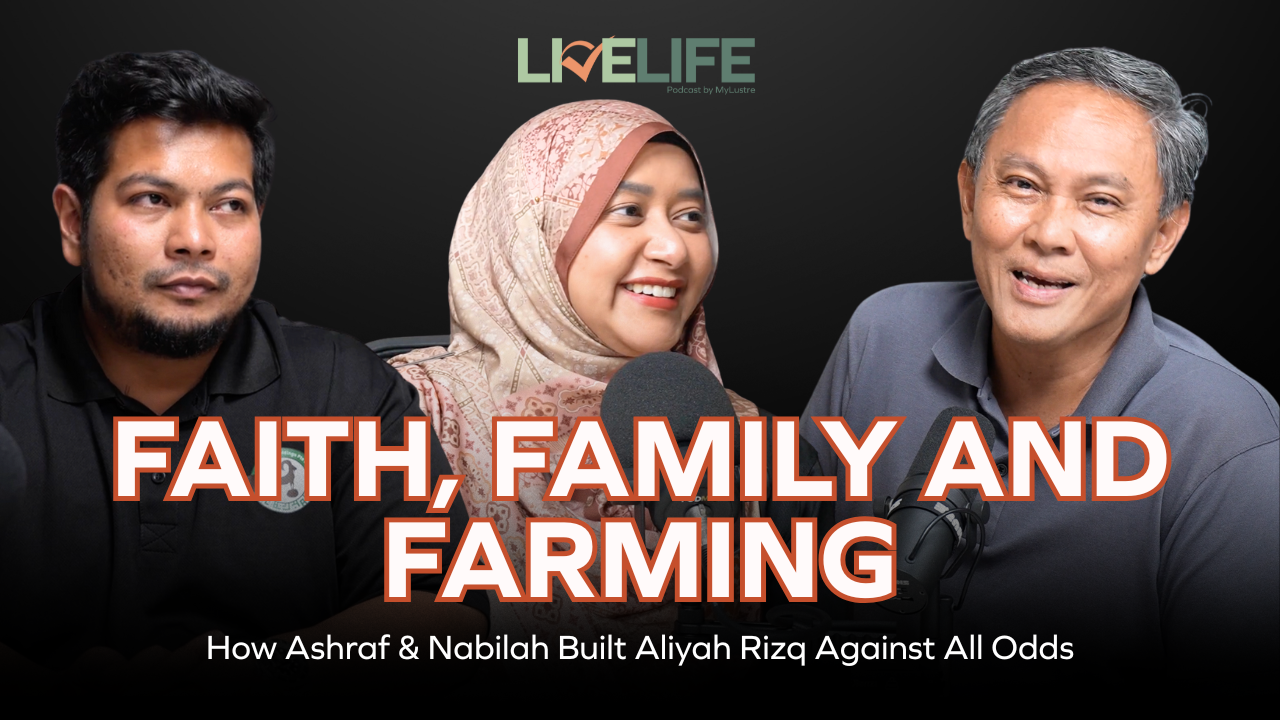Faith, Family, and Farming: How Ashraf & Nabila Built Alia Rizq Against All Odds

There’s a quiet kind of strength that comes from people who have survived storms—not just weathered them, but found meaning in the winds and grown deeper roots each time the clouds rolled in. If you ever meet Ashraf and Nabila, the husband-and-wife team behind Alia Rizq Farm, you’ll know exactly what I mean. Their journey is not just a business case study; it’s a lesson in vision, faith, sacrifice, and the ever-evolving dance of marriage.
This isn’t the usual “business success” story. In this episode, we went far beyond the headlines to uncover what it really takes to build something lasting: the heartbreaks, the messy boundaries, the late nights, and the questions nobody dares to ask on stage.
1. Dreams, Detours, and the Birth of a Farm
Most people start a business with a plan. Alia Rizq started with a dinner table conversation—and a dream that was, at first, much smaller than you might think.
Ashraf always loved animals. Breeding was a hobby. But it was his mother-in-law who voiced what many of us secretly want: a meaningful retirement, a slower life surrounded by the rhythm of nature. That “one day” wish sparked a serious family discussion—and soon enough, the seed of a business was planted.
But what’s in a name? For this family, everything. “Alia” comes from Ashraf’s mother’s name, Siti Alawiya. “Rizq” means sustenance, provision, divine blessing. The name itself was a manifesto: This farm wasn’t just about livestock. It was about serving the community and seeking blessings in both this world and the next.
What started as a plan for a small retirement farm—“30, maybe 50 goats,” as Nabila recalls—has now become a sprawling, integrated farming business that serves the community in ways the family never imagined.
2. Faith as a Business Model: Amanah, Community, and Purpose
There’s a Malay saying, “Biar lambat, asalkan selamat.” Better to be slow and right, than fast and reckless. For Ashraf and Nabila, business isn’t about shortcuts; it’s about amanah—trust, responsibility, and being answerable, not just to customers, but to God.
They’re quick to admit: every decision, especially those touching religious rituals like korban, comes with a weight far heavier than money. “The question will not just be in this world,” Ashraf says, “but also in the next.” This sense of spiritual accountability shapes everything, from how they select animals to how they distribute meat—right down to verifying that the right people receive the right share.
Some business decisions, like providing before-and-after photos for every korban order, make logistics a nightmare. But for Ashraf and Nabila, that’s the “extra mile” that defines amanah. If you can’t stand by your promise—no matter how small—what are you really building?
And it’s not just about their faith; it’s about serving the wider community, regardless of race or religion, while remaining true to Islamic requirements. Their work is a delicate balancing act of transparency, integrity, and compassion.
3. Building Brick by Brick: Endurance and Leadership on Foreign Soil
Building a farm is never easy. Building it outside your home country, with all the regulatory tangles, cultural nuances, and unpredictable risks, is another game altogether.
Ashraf remembers the early days like a blank canvas: buying timber, learning construction, working alongside contractors, and sometimes learning the hard way about trust and betrayal. “If you don’t know how to build a tree,” he laughs, “go down there and learn. If you don’t know about animals, get dirty, find out. Even the size of their droppings—you need to know.”
But the biggest lessons weren’t just about farming. They were about people. Ashraf faced betrayals—trusted staff stealing livestock and selling it behind his back. He learned to navigate not only the law, but the “grey zone” of local power brokers, unofficial permits, and unexpected visits from police or even gangs. Each mistake was a bruise, but also a badge of hard-won experience.
What sets Ashraf apart isn’t just his technical know-how, but his drive to build leaders. He trains his people so well that some leave to become competitors. Instead of resentment, he sees this as a spiritual win: “Whatever you earn, I don’t get in dollars. I get in akhirat. Enough for me.” His leadership is marked by vision, resilience, and an unshakable sense that there’s enough sustenance for everyone—rezeki itu luas.
4. The Marriage Marathon: Boundaries, Negotiation, and Sacrifice
It’s easy to romanticize couplepreneurship—until you’ve lived it. The truth? Building a business with your spouse is beautiful, but brutally hard.
Nabila, a psychologist by training, doesn’t sugarcoat their struggles. “The first two years of marriage were rocky,” she admits. Ashraf’s long absences, the demands of building something from scratch, and the pressure of using her own mother’s life savings tested their relationship in ways few people see.
Their solution? Clear boundaries. When they talk business, Nabila is not the wife—she’s the business partner and finance lead, asking hard questions and managing the bottom line. At home, those business roles are left at the door. This conscious demarcation, though hard-won and constantly recalibrated, is what allows both the marriage and the business to survive.
Even so, the lines blur. Date nights turn into business meetings. Family time gets interrupted by urgent calls. The work of recalibrating—of making sure that neither spouse nor family is neglected—is never done. But they keep talking, keep negotiating, and keep forgiving. That, Nabila says, is what makes it work.
5. Risk, Failure, and the Relentless Pursuit of Meaning
If there’s one thing Ashraf and Nabila want to impart to new entrepreneurs, it’s this: Take risks. Calculated ones. Be prepared to fail. And when you do, learn and keep moving. Ashraf openly shares how many businesses he’s tried—and failed—before finding the right fit with Alia Rizq. “Hit, miss, hit, miss, until you find it. That’s what entrepreneurship is about.”
But not all risks are financial. The hardest part is often emotional: trusting people, letting go, and knowing when to fight for something or walk away. The couple faces betrayals, setbacks, and the ever-present fear of losing everything. But through it all, they hold onto a sense of mission that goes beyond profit.
Living with purpose, for Ashraf, means knowing you’ve made a difference that matters—not just for yourself, but for your community, for the next generation, and in the eyes of your Creator. For Nabila, it’s about being true to yourself, your values, and supporting their sons in whatever path they choose—even if it’s not the farm.
6. Legacy and the Next Generation
If you ask Ashraf and Nabila what they want for their four boys, the answer isn’t what you might expect. There’s no pressure to inherit the farm, to become “the next Ashraf” or “the next Nabila.” What they dream of is creating opportunities—so that their children, and others, have the freedom to choose their own adventure.
“Opportunities are hard to come by,” Nabila reflects. “We started from scratch, with limited money. We want to build a platform, a safe space, so that whatever our kids want to pursue, they have that chance.”
This is their real legacy—not just a business, but a way of life. An invitation to others: you don’t have to start big. Start small, but dream big. Be the change. Make farming (or whatever you choose) “sexy again.”
7. Advice to Aspiring Couplepreneurs and Muslim Founders
The episode closes with practical, soulful advice from both:
- Take risks, but prepare well: Get as much knowledge as possible. Calculate the risks. Failure is not the end; it’s part of the journey.
- Boundaries matter: Separate business from marriage. Compartmentalize emotions and logic. Create “safe zones” for both.
- Respect yourself and others: Especially for women in male-dominated fields, hold onto your self-worth. Don’t be afraid to grow, speak up, and demand respect.
- Keep recalibrating: As life, business, and relationships change, keep communicating and adjusting.
- Prioritize presence: Don’t give the best of yourself to the world and the leftovers to your family. Set aside time to be fully present at home.
And above all: Build with meaning. Make a difference that makes a difference.
8. Beyond the Farm: Building Relationships, Uplifting Community
Alia Rizq isn’t just a farm. It’s a living ecosystem of faith, family, community, and possibility. They offer more than just meat—they offer experiences, education, and a rallying call for new blood to see farming and agriculture as a promising, rewarding future.
As Ashraf puts it, “We want to be the brand for your one-stop agriculture needs. And we want to be the beacon of hope for other small farmers as well.”
Whether you visit the farm, stop by their Woodlands shop, or just follow their journey online, you’ll see a business built not just on hard work, but on hope, humility, and the willingness to do things differently.
Ashraf and Nabila’s story is a reminder that real success is not about how high you climb, but how deep your roots go—and how many others you lift up along the way.
If you ever wondered what it takes to build something that lasts, look beyond the headlines, beyond the Instagram highlights. It’s in the daily grind, the small decisions, the tough conversations, and the quiet prayers.
This is what it means to build faith, family, and farming—against all odds.
Inspired? Visit Alia Rizq at Woodlands North Plaza or plan a trip to their rugged, windswept farm on the hill. And if you’re building your own dream, remember: start small, dream big, and never lose sight of your purpose.




